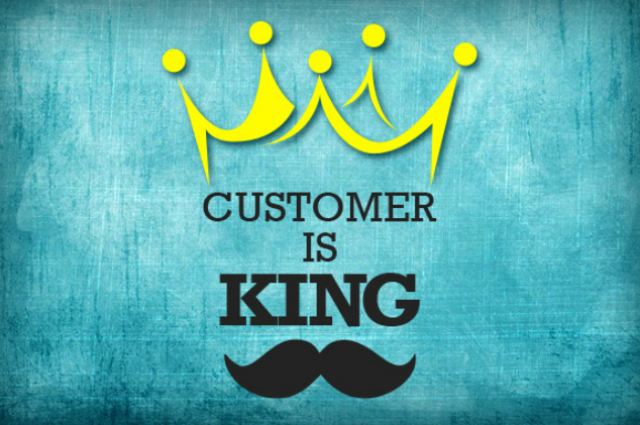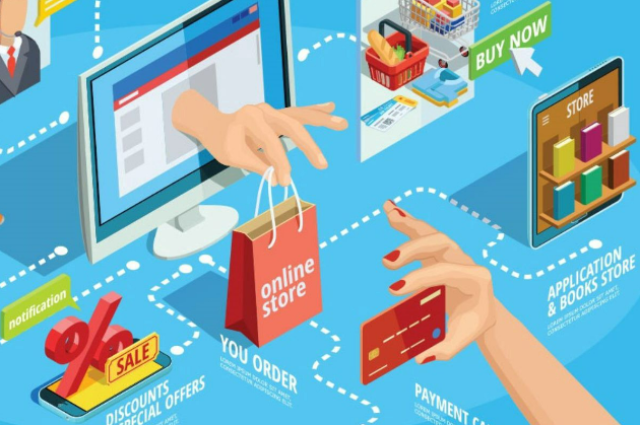Ever seen signboards outside retail outlets or maybe some popular market places lined up with shops stating:
“CONSUMER/ CUSTOMER IS THE KING"Well, indeed the buyer is considered as the sole majesty in the merchandise economies. And to establish gravity to this fact and safeguard the comforts of the buyer every year on the 15th of March, the WORLD CONSUMER RIGHTS DAY is remarked. Trust me, all of us around the globe are consumers/buyers of some or the other commodity. So this consumer’s day let’s raise a glass of glittering champagne to celebrate the rights we have got.
E-commerce doesn’t this term sound acquainted? I’m pretty sure there’s no alive Homo sapien who has not heard about Amazon, Flipkart or shopped something on Myntra, Nykaa, Snapdeal, or even booked your exotic vacation trips via Make my Trip or Yatra.com, purchased furniture to equip your homes from Pepperfry, ordered sizzling cuisines from Zomato or Swiggy.
Well, all these are some of the prevalent E-commerce Companies that prioritize and aim to provide exceptional services to their customers.
Operational internet supermarket run has become very widespread and popular among consumers. It is quite evident from the high and inflating turnovers of most electronic commerce companies.
Among the zillions of online websites wherein you can buy products, Ask yourselves how many of them are actually reliable and has a history of zero to no fraudulence. How can we ensure safe purchases and not be cheated, what to do if you have been the victim of swindling electronic companies? Well all your questions have been considered and this article will enlighten you and you are sure to find answers, so read on…
There’s nothing to panic or worry about getting cheated on while purchasing something via the internet medium. We live in a globe with well-maintained LAW and ORDER. And this is probably something that makes the human community variant from the beasts in the wilderness.
UNDERSTANDING E-COMMERCE!!!
Let’s say you demand a product or a facility online, now this makes you an e-commerce shopper, nevertheless of whether you have made the payment for it even before receiving the service ie online or offline payment after your demand has been met. This comprises of ordering the merchandise through an online website, some well-known e-commerce platforms, or even from a television ad show that screened in between last night while you were binge-watching your favorite show on tv.
Ponder on that minute when you saw a splendid set of shoes while scrolling down a FB page and thought of getting it right in front of you. In such circumstances when you purchase from an unauthentic platform – like an Instagram page selling pieces of jewelry or a pair of shoes – you are legitimately an e-business consumer. Some goods like smartphones and reading materials and amenities like e-wallet and home eateries and their delivery are frequently retailed online. Cardinal products like software packages and online tournaments that are provided a convention license — like MS Office, also come under e-commerce, when accepted online via the internet.
Your favorite e-commerce establishments from where you buy goods and merchandise on a regular basis may either have an inventory-built prototype or even a market-dependent model. The former type implies that the same corporation produces the product or delivers the facility, and trades it online. Let me cite an example to help you connect to this article. The online errands site of the fittings and fixtures concern Pepperfry or the travel planning site of the commercial airline firm Indigo are illustrations. The latter one market-dependent model, the e-commerce company serves as a marketplace for products/services offered by many small and large scale companies. The website only acts as an intermediary that facilitates the transaction. Flipkart and Amazon are some relevant illustrations.
IT'S HIGH TIME THAT WE UNFOLD THAT BLINDFOLD.
CONSUMER PROTECTION RIGHTS: DECODING THE NEW CONSUMER PROTECTION RULES
The administration should propose a much more vibrant and understandable description of what establishes ‘prejudicial’ means of trade practice. The administration should outspell and syllabize a hands-on permissible solution to confront the issue. Does a cap on the excessive distribution charges imposed by e-commerce companies. Offer for penal requirements for the defilement of rules connected to distortion. The Ministry of Consumer Affairs, Food, and Public Distribution ought to issue wide-ranging strategies for the fixation of distribution charges demanded by the marketplace units along with a full stop or at least a comma on the inflating limits of the transportation charges in the crowning hours of amenity. The Ministry must also plainly define ‘the concept of drip in the prices’— wherein the ultimate cost of the merchandise inflates up due to supplementary charges, and to supply the need for shielding customers against this by counting in the penal requirements for desecration.
As we know most of the e-commerce organizations offer many benefits, the development of the segment has rendered consumers vulnerable to new forms of unfair trade practices, violation of privacy, and issues of unattended grievances.
Predatory pricing is one such issue and it may result in the competition being wiped out and prove detrimental to consumers in the long run.
Predatory pricing is a short-term strategy, adopted by some of the market giants with deep pockets to sustain short-term losses and reduce the prices of their products below the average variable costs.
This may lead to wiping out competition from the market and could be detrimental to the consumers in the long run.
What the recent rules specify?
- The Consumer Protection (E-Commerce) Rules, 2020, notified on July 23, regulate all commercial transactions sold over a digital or electronic network.
- The e-com rules currently recognize two e-commerce business models, namely, the marketplace model and the inventory-based model.
- The rules have separate specified provisions for the marketplace- and inventory-based entities.
- The e-com rules require that all information on the return, refund, exchange, warranty and guarantee, delivery, and shipment of the goods or services being sold, including their country of origin, be provided on the platform.
Such details enable consumers to make informed decisions.
HERE'S A QUICK GUIDE TO ENSURE A SAFE AND HAPPY ONLINE SHOPPING:
1) Don't get played.
While making online purchases it is always advisable to use your credit cards and not your debit cards as the latter one is directly linked to your bank account. And moreover credit cards provide 0 liability for fraud scams.
2) Watch out for those Email pit falls.
When was the last time you received an email or a text message claiming to offer splendid low-cost deals or stating that there's an issue with the packaging of a random product you ordered online??
Well please do trust your Gut feeling which told you 'maybe this is spam' Never open the attachments or click on the links received from unfamiliar senders as it is more than sufficient to malware your phones or computers.
3) Create Warrior passwords.
Wondering what Warrior passwords are? lemme put it this way. The internet and the online shopping sites can sometimes be a battlefield so you definitely need soldiers and warriors to protect your data. Train your warriors that is make use of complex set of numbers, lowercase letters uppercase letters and symbols while setting your password. avoid personal information like your birthday or your favorite color that could be easy for a scamster to guess. Dear Consumers get creative while setting your passwords.
4) Who doesn't like being on the safer shore? shop with trusted and highly reputable E-commerce brands.
Wise people often shop their products with the online retailers they know and trust, add the authentic trusted shopping sites to your home screen so the next time you think of buying a wedding attire or you run out of groceries you can reach out the official site easily. completely avoid typing the name of the retailers into your browsing bar because a minute typing error can lead you to a fake website that looks like the real one.
5) Say a NO in all caps to browsing shopping sites using public Wi-Fi.
The next time you sip your favorite coffee from Starbucks or Coffee Day using the free Wi-fi, just remember that the random guy/girl just staring at his/her phone can spy on and access your online activity. Even if you wanna use public Wi-Fi make sure that you use a VPN aka virtual private network as it can potentially create a barrier that is encrypted between your device and the server.
TO ALL THE READERS WHO HAVE REACHED THIS FAR READING THIS ARTICLE, CONGRATS HERE'S A BONUS TIP JUST FOR YOU.
It's no secret that NO SHOPPING SERVERS EVER ASK YOU TO SHARE YOUR SOCIAL SERVICE NUMBER. If a site demands you to share the same then mark it spam and gallop towards the other direction.
THE CASE:
"I'll sue you for this, I'll see you in the court." Doesn't this dialogue sound kind of familiar? Hell yes seems like a verse from some 90's Bollywood movie but can't recollect the name of the movie? ME neither. doesn't matter, but do lemme know in the comments.
Make yourself some hot tea coz beneath this line there's a steaming case.
It was -
FLIPKART Vs. Pune Resident:
Ms. Gaurangi Deshmukh, a resident of the 'city with an attitude' aka Pune. She had paid rupees 28,890 via net banking for a Nikon DSLR camera on Flipkart. The order for this product was placed on the 4th of February, 2018. But on the 5th of February, she received a parcel with an empty deal bag and no Camera. she had clearly mentioned that the parcel has to be handed over to her residential only and not to some third party, in spite of this demand the delivery boy handed over the product, I mean the empty bag to the security guard of the flat. Since her father was at home, the guard handed it over to him. when she returned home and unwrapped the box it was observed that the camera was missing and also the parcel was primitively packed with the cello tapes torn already from either side before it was unboxed by Ms. Gaurangi. She then filed a case against the e-commerce company FLIPKART under section 12 of the Consumer Protection Act of 1986, This section of the act deals with the deficiency in the service that was provided. The court then issued a notice to Flipkart ordering its representatives to appear before the court, which the E-commerce company ignored, the court then issued an ex-parte order to Flipkart on August 14. Finally, a legal representative appeared in the court of law on behalf of Flipkart on the 10th of October.
Just closely observe the timeline of this case. There's a popular saying that "1 year in the life of a common man= 1 day in the court of law." I'm pretty sure that the mathematicians are gonna disagree, wrong math but right logic, and this statement does hold experimental visible proof.
After closely analyzing the arguments from both parties the court asked Flipkart to refund 28,990 rupees to the consumer with a 9 percent interest and compensation of 15000 rupees towards the mental and physical agony that the consumer had to bear. so after doing the basic class 4 math it is observed that Flipkart had to pay rupees 44,000 as compensation to the consumer.
To top this article off here's a cherry on the cake, and a pinch of motivation to all the business enthusiasts out there.
CASE STUDY:
Just like how honey lures the honey bees, This small E-commerce company was able to attract 2.93 lakh Facebook.
- DIAMOND CANDLES: Yep, note that name. Now, this is an e-commerce company that sells scented candles mostly soy-based that has a very attractive ring at the bottom of it. only some lucky human beings would find the ring with the purchase of these candles. Now, this is definitely a mastermind MARKETING STRATEGY. The people started doing the PR work of this company by spreading the word about this brand because of the exciting hidden prize ring.
- HOW WERE THEY ABLE TO CLIMB THE LADDER OF SUCCESS?: It's simply because of the brilliant marketing idea. while most of their competitors were spending high on purchasing ads to drive sales.
- DIAMOND CANDLES DIDNT SPEND A SINGLE PENNY ON ADS: They created an environment encouraging their product buyers to take a photo with that attractive ring at the bottom and share it on social media, genius, by doing so this would certainly expose their product and they get a free brand promotion.
So the aftermath of this case study would be the fact that your consumers/customers are your greatest assets especially when it comes to marketing and sales.
Here's an equation for a successful startup business:
Higher Customer Satisfaction= Free PR and marketing+ massive turnovers.
THIS WORLD Consumer's Day let's pledge to be responsible customers and also equip ourselves with the knowledge of law. And all the sellers in the market come on guys you too ought to take an oath to focus more on customer satisfaction as it can exponentially shower you with profits.







